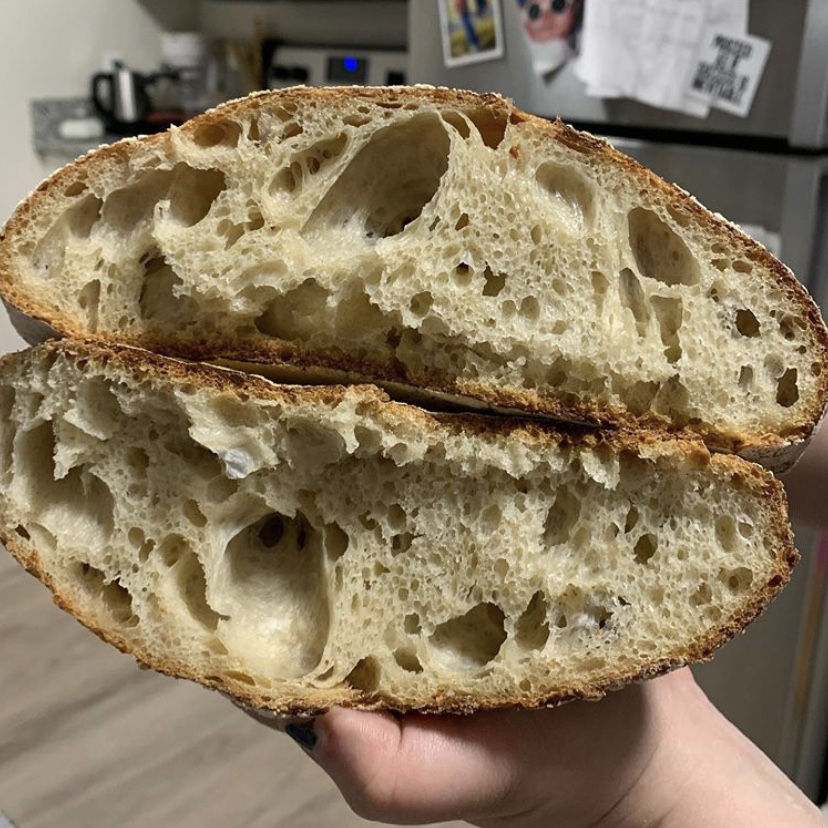To avoid loafing around since classes went online, many Binghamton University students have risen to the challenge of learning a new hobby.
The coronavirus outbreak has predictably resulted in an outpouring of memes, fads and internet trends as people look to keep busy indoors. This includes the omnipresence of fresh bread on social media as people fight boredom with baking. The craze seems to have captured people of all ages, and BU students are no exception.
Sarah Starace, a senior majoring in biology, started baking bread almost a year ago, making her own sourdough starter at the beginning of this academic year.
“I took a long time off from bread because the school year got busy and there’s not that much time to make bread when you’re going to class every day,” Starace said. “But since everything [happened] with the quarantine, I’ve been making bread at least once a week.”
Lilly Griffin, a sophomore majoring in biology, started making sourdough last year while she was at home on Long Island. She also noted that the hobby is more feasible now that regular class schedules have been altered.
“It’s nice to have the time to bake a loaf of bread,” Griffin said. “It takes all day because you have to let it rise.”
Like Griffin and Starace, many quarantine bakers have specifically taken on the project of making sourdough bread. The creation of sourdough can take anywhere from a few days to months, depending on how long the baker wants to let their dough ferment. The process involves the daily “feeding” of a jarred flour and water mixture, where water is added and small amounts of dough are removed and discarded.
While the process has been derided as wasteful by some, bakers often use their discarded dough to make other treats while waiting for the bread dough to ferment. Starace has made sourdough crackers and scallion pancakes from hers, even adding it in small amounts to other recipes like garlic knots and cakes.
The trend has also led to yeast and flour shortages across the United States, and Griffin said the effects of shortages have been visible in stores near her.
“It’s been kind of crazy trying to get the ingredients to make bread,” Griffin said. “I had to ask my friend for bread flour because she had an extra bag, and it’s impossible to find flour or yeast in the stores right now.”
Philipine Mariaud, a sophomore majoring in philosophy, politics and law, has been baking bread with her family since she was a kid, but she said newcomers to the practice are likely finding inspiration online.
“Everyone’s putting their baking on social media, so everyone else wants to do it,” Mariaud said.
While some might call it a fad, the virtues of making bread seem to go beyond the simple satisfaction of posting a photo or scarfing down a tasty loaf. Mariaud said the practice keeps her family better connected with the food they’re eating.
“My parents are French, so they just like making their own bread, but definitely more since COVID-19,” Mariaud said. “It’s more practical and just healthier, and you know what’s going in. There’s no harmful preservatives.”
Eden Donelli, a freshman majoring in psychology, said baking bread has been helping her bond with her stepmother.
“In a period where so much of our classes and interactions are online, doing something practical that ends in a tasty product is really grounding,” she said.
Starace also said food has been helping her connect with loved ones.
“I like cooking things from scratch because it gives me a lot of joy, I like giving food to my friends,” Starace said. “A lot of my friends already went home, and I sent them home with bread, or cooked them a meal before they left, just because I think it’s a really nice way to connect with other people.”
Starace compared the recent trend of bread baking to the comfort of playing video games like Minecraft and Animal Crossing, both of which have become wildly popular since the outbreak started.
“It’s something that keeps me grounded, gives me something to do and keeps me focused on something that isn’t the coronavirus,” she said. “If you’re not partaking in it, it’s so easy to be like, ‘That’s so pointless, why are you making that,’ but if you are one of the people that’s doing it, it’s really therapeutic and a lot of people find it really calming. I don’t personally play video games, but I know a lot of people play video games to calm down. I know baking has a really similar feel for some people.”
Griffin agreed that both the process and the results of baking bread can make isolation a little more bearable.
“A fresh hot loaf of bread is so delicious, but especially now with everything going on in the world,” she said. “It’s something to relax with and take your mind off what’s going on.”



